中华人民共和国税收征收管理法实施细则中华人民共和国合同
征管法实施细则

《中华人民共和国税收征收管理法实施细则》(全文)第一章总则第一条根据《中华人民共和国税收征收管理法》(以下简称税收征管法)的规定,制定本细则。
第二条凡依法由税务机关征收的各种税收的征收管理,均适用税收征管法及本细则;税收征管法及本细则没有规定的,依照其他有关税收法律、行政法规的规定执行。
第三条任何部门、单位和个人作出的与税收法律、行政法规相抵触的决定一律无效,税务机关不得执行,并应当向上级税务机关报告。
纳税人应当依照税收法律、行政法规的规定履行纳税义务;其签订的合同、协议等与税收法律、行政法规相抵触的,一律无效。
第四条国家税务总局负责制定全国税务系统信息化建设的总体规划、技术标准、技术方案与实施办法;各级税务机关应当按照国家税务总局的总体规划、技术标准、技术方案与实施办法,做好本地区税务系统信息化建设的具体工作。
地方各级人民政府应当积极支持税务系统信息化建设,并组织有关部门实现相关信息的共享。
第五条税收征管法第八条所称为纳税人、扣缴义务人保密的情况,是指纳税人、扣缴义务人的商业秘密及个人隐私。
纳税人、扣缴义务人的税收违法行为不属于保密范围。
第六条国家税务总局应当制定税务人员行为准则和服务规范。
上级税务机关发现下级税务机关的税收违法行为,应当及时予以纠正;下级税务机关应当按照上级税务机关的决定及时改正。
下级税务机关发现上级税务机关的税收违法行为,应当向上级税务机关或者有关部门报告。
第七条税务机关根据检举人的贡献大小给予相应的奖励,奖励所需资金列入税务部门年度预算,单项核定。
奖励资金具体使用办法以及奖励标准,由国家税务总局会同财政部制定。
第八条税务人员在核定应纳税额、调整税收定额、进行税务检查、实施税务行政处罚、办理税务行政复议时,与纳税人、扣缴义务人或者其法定代表人、直接责任人有下列关系之一的,应当回避:(一)夫妻关系;(二)直系血亲关系;(三)三代以内旁系血亲关系;(四)近姻亲关系;(五)可能影响公正执法的其他利害关系。
新税收征管法实施细则

新税收征管法实施细则税收征管是税务管理的重要组成部分,是税务机关根据有关的税法的规定,对税收工作实施管理、征收、检查等活动的总称,又称“税收稽征管理”。
下文是最新税收征管法实施细则全文,欢迎阅读! 最新税收征管法实施细则全文(2017最新版本)第一章总则第一条根据《中华人民共和国税收征收管理法》(以下简称税收征管法)的规定,制定本细则。
第二条凡依法由税务机关征收的各种税收的征收管理,均适用税收征管法及本细则;税收征管法及本细则没有规定的,依照其他有关税收法律、行政法规的规定执行。
第三条任何部门、单位和个人作出的与税收法律、行政法规相抵触的决定一律无效,税务机关不得执行,并应当向上级税务机关报告。
纳税人应当依照税收法律、行政法规的规定履行纳税义务;其签订的合同、协议等与税收法律、行政法规相抵触的,一律无效。
第四条国家税务总局负责制定全国税务系统信息化建设的总体规划、技术标准、技术方案与实施办法;各级税务机关应当按照国家税务总局的总体规划、技术标准、技术方案与实施办法,做好本地区税务系统信息化建设的具体工作。
地方各级人民政府应当积极支持税务系统信息化建设,并组织有关部门实现相关信息的共享。
第五条税收征管法第八条所称为纳税人、扣缴义务人保密的情况,是指纳税人、扣缴义务人的商业秘密及个人隐私。
纳税人、扣缴义务人的税收违法行为不属于保密范围。
第六条国家税务总局应当制定税务人员行为准则和服务规范。
上级税务机关发现下级税务机关的税收违法行为,应当及时予以纠正;下级税务机关应当按照上级税务机关的决定及时改正。
下级税务机关发现上级税务机关的税收违法行为,应当向上级税务机关或者有关部门报告。
第七条税务机关根据检举人的贡献大小给予相应的奖励,奖励所需资金列入税务部门年度预算,单项核定。
奖励资金具体使用办法以及奖励标准,由国家税务总局会同财政部制定。
第八条税务人员在核定应纳税额、调整税收定额、进行税务检查、实施税务行政处罚、办理税务行政复议时,与纳税人、扣缴义务人或者其法定代表人、直接责任人有下列关系之一的,应当回避:(一)夫妻关系;(二)直系血亲关系;(三)三代以内旁系血亲关系;(四)近姻亲关系;(五)可能影响公正执法的其他利害关系。
税收法律法规大全
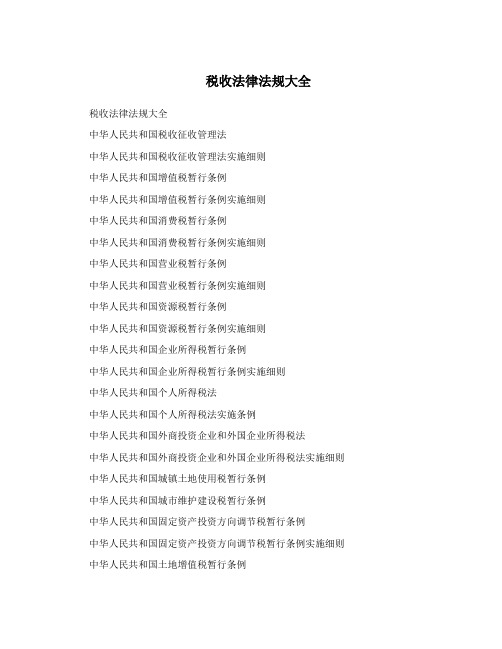
税收法律法规大全税收法律法规大全中华人民共和国税收征收管理法中华人民共和国税收征收管理法实施细则中华人民共和国增值税暂行条例中华人民共和国增值税暂行条例实施细则中华人民共和国消费税暂行条例中华人民共和国消费税暂行条例实施细则中华人民共和国营业税暂行条例中华人民共和国营业税暂行条例实施细则中华人民共和国资源税暂行条例中华人民共和国资源税暂行条例实施细则中华人民共和国企业所得税暂行条例中华人民共和国企业所得税暂行条例实施细则中华人民共和国个人所得税法中华人民共和国个人所得税法实施条例中华人民共和国外商投资企业和外国企业所得税法中华人民共和国外商投资企业和外国企业所得税法实施细则中华人民共和国城镇土地使用税暂行条例中华人民共和国城市维护建设税暂行条例中华人民共和国固定资产投资方向调节税暂行条例中华人民共和国固定资产投资方向调节税暂行条例实施细则中华人民共和国土地增值税暂行条例中华人民共和国土地增值税暂行条例实施细则中华人民共和国房产税暂行条例中华人民共和国城市房地产税暂行条例中华人民共和国车船使用税暂行条例中华人民共和国车船使用牌照税暂行条例中华人民共和国印花税暂行条例中华人民共和国印花税暂行条例施行细则中华人民共和国屠宰税暂行条例中华人民共和国筵席税暂行条例中华人民共和国农业税条例中华人民共和国耕地占用税暂行条例中华人民共和国契税暂行条例中华人民共和国契税暂行条例实施细则征收教育费附加的暂行规定文化事业建设费征收管理暂行办法中华人民共和国车辆购置税暂行条例 ?TOMPDA,逝水年华制作,,,,,,,,,,,,,,,,,,,,,,,,,,,,,,,,,,,,,,中华人民共和国税收征收管理法《中华人民共和国税收征收管理法》已由中华人民共和国第九届全国人民代表大会常务委员会第二十一次会议于2001年4月28日修订通过,现将修订后的《中华人民共和国税收征收管理法》公布,自2001年5月1日起施行。
中华人民共和国税收征收管理法第一章总则第一条为了加强税收征收管理,规范税收征收和缴纳行为,保障国家税收收入,保护纳税人的合法权益,促进经济和社会发展,制定本法。
中华人民共和国税收征收管理法实施细则_英文版_国务院令[2002]第362号_2002-10-15生效
![中华人民共和国税收征收管理法实施细则_英文版_国务院令[2002]第362号_2002-10-15生效](https://img.taocdn.com/s3/m/309d8cec5ef7ba0d4a733b14.png)
plans and implementation methods formulated by the State Administration of Taxation.The local People's Governments at various levels should positively support the tax information system construction and organize to realize information sharing between the relevant departments.Article 5 The secrecy that the tax authorities shall keep for the taxpayers and withholding agents as mentioned in Article 8 of the Tax Administration Law refers to the commercial secrecy and privacy of the taxpayers and withholding agents. The tax offences of the taxpayers and the withholding agents are not within the scope of the secrecy keeping.Article 6 The State Administration of Taxation should set out the criteria and standards for the behaviour and services of the tax staff.When discovering offences of the tax authorities at lower levels, the upper level tax authorities should timely rectify them. The lower tax authorities should make timely corrections in accordance with the decision of the tax authorities above.When discovering tax offences of tax authorities at a higher level, the tax authorities finding that offences should report to the tax authorities above or the relevant departments.Article 7 The tax authorities shall prize the informants upon their contribution. The fund for the prize shall be included in the annual budget of the tax department for separate accounting. The specific method and standards for the prize shall be made by the State Administration of Taxation together with the Ministry of Finance.Article 8 When assessing the tax payable, adjusting the pre-assumptive tax amount, conducting tax inspection, imposing tax penalty and/or handling tax administrative review, the tax staff should refrain from the case when having one of the following relations with the taxpayers, withholding agents or their legal representatives, directly responsible persons:(1) Husband and wife.(2) Direct blood relatives.(3) Indirect blood relatives within three generations.(4) Close relatives through marriage.(5) Other relations that may influence the impartial execution of laws.Article 9 The tax organizations to be set up and made public as ruled by the State Council as mentioned in Article 14 of the Tax Administration Law refer to the tax investigation bureaus at and below provincial level. The tax investigation bureaus are exclusively in charge of the investigation and dealing of tax evasion, tax arrears, cheating of tax and tax refusal cases.The State Administration of Taxation should make clear the duties of the tax offices and the tax investigation bureaus to avoid overlapping of duties.Chapter 2 Tax RegistrationArticle 10 The SAT offices and the local tax bureaus should adopt the same code for the same taxpayer and share the information.The specific method for tax registration shall be formulated by the State Administration of Taxation.Article 11 The Industrial and Commercial Administration Departments at various levels should regularly inform the SAT offices and the local tax bureaus at the same level of the registration of opening business, changes, de-registration and suspension and cancellation of business licenses.The specific methods of informing shall be made jointly by the State Administration of Taxation and the State Industrial and Commercial Administration.Article 12 The taxpayers engaged in production or business operations should file a written application for tax registration with the competent tax authorities at the location of production and business operation or where the tax obligation arises within 30 days after obtaining the business license. The taxpayers should truthfully fill in the tax registration form and provide the relevant documents, materials as required by the tax authorities.The taxpayers rather than the above, except for the State organs and individuals, should, within 30 days after the date of tax obligation arising, bring the relevant documents to the local competent tax authorities for tax registration.The method for Individual Income Tax registration shall be formulated by the State Council separately.The pattern of the tax registration certificate shall be produced by the State Administration of Taxation.Article 13 The withholding agents should, within 30 days after the date of withholding obligation arising, go to the local competent tax authorities for withholding registration, and obtain the withholding registration certificate. For the withholding agents who have already finished tax registration, the tax authorities may simply record the tax withholding items in the tax registration certificate and shall not issue the withholding registration certificate.Article 14 Where a change occurs in the contents of tax registration, the taxpayer concerned shall, within 30 days after the date of completing the formalities for such change of registration with the Administration for Industry and Commerce or other departments, report to and complete the formalities for change of tax registration with the original tax authorities by presenting the relevant supporting documents.Where taxpayer's tax registration contents change but there is no need to change the registration with the Administration for Industry and Commerce or other departments, the taxpayer shall, within 30 days after the change, present the relevant documents to the original tax authorities to apply to change the tax registration.Article 15 If a taxpayer is involved in dissolution, bankruptcy, cancellation or other circumstances, thus terminating its tax payment obligations pursuant to the law, the taxpayer shall, before cancelling its registration with the Administration for Industry and Commerce or other departments, present the relevant documents to the original tax authorities to apply for cancellation of its tax registration. If, in accordance with regulations, the taxpayer is not required to cancel its registration with the Administration for Industry and Commerce or other departments, the taxpayer shall, within 15 days after the relevant organ approving or announcing the termination, present the relevant documents to the original tax authorities to apply for cancellation of its tax registration.If a change in a taxpayer's address of residence or address of business operations necessities an alteration of the tax authorities for its tax registration, the taxpayer shall, before applying to theAdministration for Industry and Commerce or other departments to amend or cancel its registration and before changing its address of residence or address of business operations, present the relevant documents to the original tax authorities to apply for cancellation of its tax registration and shall carry out tax registration procedures with relevant tax authorities in the new region within 30 days.A taxpayer whose business license is revoked by the Administration for Industry and Commerce or whose registration is cancelled by other departments shall, within 15 days of the revoking of the business license or cancellation of the registration, apply to the original tax authorities for cancellation of its tax registration.Article 16 Before carrying out procedures to cancel its tax registration, a taxpayer shall settle all taxes payable, late payment penalties and other fines and shall turn over invoices, tax registration certificates and other tax documents to the tax authorities.Article 17 Taxpayers engaged in production, business operation should report to the competent tax authorities in written form all of their account numbers within 15 days after opening the basic deposit accounts or other deposit accounts. In case of change, the taxpayers should report in written to the competent tax authorities about the change within 15 days after the change.Article 18 Except in cases where a tax registration certificate is not required in accordance with regulations, a taxpayer must present a tax registration certificate when carrying out the following matters:(1) Opening bank accounts.(2) Applying for a tax reduction, exemption or refund.(3) Applying for a deferred tax report or tax payment.(4) Purchasing invoices.(5) Applying for a certificate of tax administration for business operations in other areas.(6) Handling business termination or business close.(7) Other relevant tax matters.Article 19 The tax authorities shall implement a regular certificate inspection and replacement system for tax registration certificates. A taxpayer shall present the relevant documents to the competent tax authorities within the prescribed time limit to undergo certificate inspection or replacement procedures.Article 20 Taxpayers should openly hang the tax registration certificates at the premises of their production, business operation or offices for the inspection of the tax authorities.In case of losing the tax registration certificate, the taxpayer should report in written to the competent tax authorities and announce in paper the invalidity of the certificate.Article 21 A taxpayer engaged in production or business operations who wants to temporarily undertake production or business activities in another country (town) must present the duplicate of the tax registration certificate and the certificate for tax administration of outside operations issued by the local tax authorities to the tax authorities in the new place of operations for inspection and registration and shall be subject to its administration.The taxpayers who undertake production, business operation for more than 180 days accumulatively in the same other area should go through the tax registration formalities at the place of the business operation.Chapter 3 Administration of Accounting Books and Supporting VouchersArticle 22 A taxpayer engaged in production or business operations shall, in accordance with the relevant rules of the State, establish accounting books within 15 days after the date of obtaining its business license or after the day of tax obligation arises.The term "accounting books" as stated in the previous paragraph shall refer to general ledgers, detailed accounts, journals and other auxiliary accounting books. General ledgers and journals should be in a bound form.Article 23 The taxpayers engaged in industry and commerce with only a small production or business operation which genuinely lacks the ability to keep accounting books may hire the professional organizations approved for engagement in accounting agents or the accounting personnel recognized by the tax authorities to keep its books and handle accounting matters. Should there be real difficulty in hiring the above organizations or personnel, the party may, with approval by tax authorities at country or higher level, keep a book for pasting in all receipt and expenditure vouchers, a goods purchase and sale registry or use tax control system in accordance with the rules by the tax authorities.Article 24 Within 15 days of receipt of its tax registration certificate, a taxpayer engaged in production or business operations shall submit details of its financial and accounting systems or methods to the competent tax authorities for records.In case of making accounting records by computers, the taxpayers should, before use of that, report the accounting software, instructions for use and the relevant materials of the electronic accounting system to the competent tax authorities for records.The electronic accounting system set up by the taxpayers should satisfy the relevant rules of the State and be able to correctly, completely account the revenue or income of the taxpayers.Article 25 Within 10 days from the start of its tax withholding obligations as prescribed by the tax laws and administrative regulations, a withholding agent shall establish a tax withholding and remitting or collecting and remitting book pursuant to the categories of tax to be withheld or collected.Article 26 Where the accounting system of the taxpayers, withholding agents is complete and is able to correctly, completely compute the revenue and income or the tax withholding, the print-out of the complete paper accounting records may be taken in place of the accounting books.Where the accounting system of the taxpayers, withholding agents is not complete and can not be able to correctly, completely compute the revenue and income or the tax withholding, the taxpayers should set up the general accounting records and the other accounting books relevant to tax payment or tax withholding.Article 27 Accounting books, supporting vouchers and statements shall be kept in Chinese. In a national minority autonomous region, the local minority language script in common use throughout the region may be used simultaneously. Enterprises with foreign investment and foreign enterprises may use a foreign language script simultaneously.Article 28 Taxpayers should install and use tax control equipment as required by the tax authorities and report the relevant data and materials according to the rules of the tax authorities.The administrative method for usage and application of tax control equipment shall be formulated by the State Administration of Taxation separately and shall be implemented after approval by the State Council.Article 29 The accounting books, supporting vouchers, statements, tax payment receipts, invoices, documents for exportation and other tax relevant materials should be legal, truthful and complete.The accounting books, supporting vouchers, statements, tax payment receipts, invoices, documents for exportation and other tax relevant materials should be kept for at least 10 years, except otherwise ruled by laws, administrative regulations and rules.Chapter 4 Filing Tax ReturnsArticle 30 The tax authorities should set up and improve the self-assessment system. Upon approval by the tax authorities, taxpayers and withholding agents may file tax returns or submit the withholding reports by mail or electronic data forms.The electronic data forms refer to the forms of telephone voice, electronic data exchange and network transmission confirmed by the tax authorities.Article 31 In filing tax returns by mail, the taxpayers should use the uniform tax filing envelope and take the receipt of the post department as the evidential documents for tax report. The date of the post stamp shall be the actual reporting date for return filing by mail.In filing returns by electronic form, the taxpayers should keep the relevant materials within the time limit ruled by the tax authorities and should regularly submit to the tax authorities in written form.Article 32 Where taxpayers have no tax payable in the tax period, the taxpayers should go through the tax reporting as well.During the tax reduction and tax exemption period, the taxpayers enjoying tax reduction and/or tax exemption should deal with the tax reporting by the relevant rules.Article 33 The tax return or reporting schedule on taxes withheld and remitted or collected and remitted which is submitted by a taxpayer or withholding agent accordingly shall include the following items: tax category, taxable items, taxable projects or projects on which tax should be withheld and remitted or collected and remitted, basis for tax calculations, deductible items and standards, applicable tax rate or tax amount per unit, tax items refundable and amount of tax, tax reduction and exemption items and amount of tax, amount of tax payable or the amount of tax due to be withheld and remitted or collected and remitted, the applicable tax period, deferred tax payment, tax arrears and late payment interest.Article 34 A taxpayer submitting a tax return shall complete the tax return accurately and, depending on the circumstances, shall submit the following relevant documents and materials accordingly:(1) Financial and accounting statements and related explanatory materials.(2) Contracts and letters of agreement relevant to tax payment and documents.(3) Electronic tax reporting materials.(4) Tax administration certificates for business operations in other areas and tax completion certificates of other areas.(5) Relevant documents issued by notary bodies within and without China.(6) Other relevant documents and materials required by tax authorities in accordance with regulations.Article 35 A withholding agent filing a reporting schedule on taxes withheld and remitted or collected and remitted shall complete the form accurately and submit legal certificates related to its tax withholding and remitting or collecting and remitting obligations, as well as other relevant documents and materials required by the tax authorities.Article 36 The taxpayers paying tax on a regular and fixed basis may adopt the tax reporting in a simplified way, by putting together the tax payment periods.Article 37 If a taxpayer or withholding agent has genuine difficulty in submitting a tax return or a reporting schedule on taxes withheld and remitted or collected and remitted within the prescribed time limit and requires an extension, a written application for an extension shall be submitted to the tax authorities within the prescribed time limit and, upon examination and approval of application by the tax authorities, procedures shall be completed within the approved extension period.If a taxpayer or withholding agent is unable to submit a tax return or a reporting schedule on taxes withheld and remitted or collected and remitted within the prescribed time limit due to force majeure, the period may be extended, but a report must be submitted to the tax authorities immediately after the force majeure conditions have abated. The tax authorities shall grant approval after verifying the facts.Chapter 5 Tax CollectionArticle 38 The tax authorities should strengthen the tax collection and administration, and set up and perfect the responsibility system.The tax authorities should determine the mode of tax collection in line with the principle of ensuring the timely payment of tax in full amount to the Treasury, providing convenience to the taxpayers and lowering the tax costs.The tax authorities should strengthen the administration over the taxpayer's export tax refund. The specific method for the administration shall be formulated by the State Administration of Taxation together with the relevant departments of the State Council.Article 39 The tax authorities should timely hand in the taxes, late payment interest and fines to the State Treasury based on the budgetary levels and items as ruled by the State. The tax authorities should not occupy, take away or take part of them for other use and should not put them into any account other than those tax accounts of the State or the Treasury.Any unit and individual should not arbitrarily change the budgetary item and level for the taxes, late payment interest and fines already paid into the State Treasury.Article 40 The tax authorities should encourage the use of checks, bank credit cards and electronic settlement in payment of taxes based on the principle of convenience, quickness and safety.Article 41 One of the following cases belongs to the case of difficulty as mentioned in Article 30 of the Tax Administration Law:(1) The taxpayers have suffered from large losses due to force majeure and thus the normal production and business operation is affected seriously.(2) The balance of the current monetary funds after deduction of wages payable and social security contribution is not enough to pay the taxes.The SAT offices and the local tax bureaus of the specially listed cities may examine and approve the deferral of tax payment in reference to paragraph 2 of Article 30 of the Tax Administration Law.Article 42 In case of needing to defer the payment of taxes, the taxpayers should put forward the application before the expiration of the time limit for tax payment and hand in the following materials: the application report for the deferral of tax payment, current monetary fund balance statement and all bank reconciliation statements, balance sheets, the budget of wages payable and social security contribution as required by the tax authorities.The tax authorities should work out the agreement or disagreement within 20 days after receiving the application report for the deferral of tax payment. In case of disagreement, late payment interest shall be collected starting from the date of expiration of the time limit for the tax payment.Article 43 The taxpayers eligible for tax exemptions or reductions as regulated by laws and administrative regulations or as approved by the statutory approving departments should bring the relevant documents to the competent tax authorities for going through the tax exemptions and reductions formalities. At the expiration of the tax reductions and exemptions, the taxpayers should resume tax payment starting from the day following the expiration day.When the conditions for the tax reductions and exemptions change, the taxpayers enjoying the tax exemptions and reductions should report to the tax authorities within 15 days after the change. Those not satisfying the conditions for the reductions and exemptions should perform the tax payment obligation by law. Where the taxpayers do not pay the tax by law, the tax authorities shall pursue that.Article 44 The tax authorities may, based on the principle of being favorable to tax administration and control, convenient for the taxpayers' tax payment and in accordance with relevant State regulations, entrust related entities and individuals to collect small, decentralized, nuisance tax payments and the payment in different places and shall issue them a certificate of an entrusted tax collector. The entrusted entities and individuals shall collect taxes lawfully in the name of the tax authorities pursuant to the conditions prescribed in the certificate of the entrusted tax collectors and the taxpayers should not refuse. In case of refusal by the taxpayers, the entrusted entities and individuals should timely report to the tax authorities.Article 45 The term "tax payment receipts" as stated in Article 34 of the Tax Administration Law shall refer to the various types of tax payment certificates, tax memos, tax stamps, withholding or collecting certificates and other tax payment documents.Without designation of the tax authorities, any unit and individual shall not be allowed to print tax payment receipts. The tax payment receipts should not be lent, sold, forged or changed.The format of a tax payment receipt and the method for its management shall be formulated by the State Administration of Taxation.Article 46 After receiving the tax payment, the tax authorities should issue the tax payment receipts to the taxpayers. The taxpayers shall pay the tax through the banks. The tax authorities may entrust the banks to issue the tax payment receipts.Article 47 In the case of a taxpayer in one of the circumstances stated in Article 35 or 37 of the Tax Administration Law, the tax authorities shall have the right to use any one of the following methods to assess the amount of tax payable:(1) Assess the tax payable in reference to the tax burden level of the taxpayers of similar business size and revenue level of the same sector or similar sector in the same place.(2) Assess the amount of tax payable according to the business revenue or cost plus reasonable amounts of expenses and profits.(3) Assess the amount of tax payable according to a calculation or assessment of the amount of raw materials, fuels, power, and that consumed.(4) Assess the amount of tax payable according to other reasonable methods.If using one of the above-mentioned methods is insufficient to accurately assess the amount of tax payable, two or more methods may be used simultaneously.Where the taxpayers have objections to the assessment of the tax authorities by using one of the above methods, the taxpayers should provide the relevant evidences and the tax authorities shall make adjustment to the tax payable after verifying the evidences.Article 48 The tax authorities shall be responsible for the evaluation of the reputation level of the taxpayers. The method for the evaluation shall be formulated by the State Administration of Taxation.Article 49 Where the subcontractors or lessees have independent production and business operation rights and are independent in accounting and regularly pay the contract makers or lessors the contract commissions or rentals, the subcontractors or lessees should pay income tax on the revenue and income from their production and business operation and accept the tax administration, except otherwise regulated by laws and administrative regulations.Within 30 days after contract or lease making, the contract makers or the lessors should report to the competent tax authorities about the subcontractors and lessees. Should the contract makers or the lessors fail to report that, they shall bear the associated responsibility with the subcontractors or the lessors.Article 50 In case of disbanding, cancellation or bankruptcy, the taxpayers should, before liquidation, report to the competent tax authorities. For those not settling the tax payment, the competent tax authorities shall participate in the liquidation.Article 51 The term "associated enterprises" as stated in Article 36 of the Tax Administration Law shall refer to companies, enterprises or other economic entities which have one of the following relationships:(1) Direct or indirect ownership or control in relation to such areas as capital, business operations and purchases and sales.(2) Direct or indirect ownership or control by a third party.(3) Other mutually beneficial associations.A taxpayer shall be obliged to provide to its local tax authorities with details of price, expense standards, etc., with regard to its business transactions with associated enterprises. The specific method shall be formulated by the State Administration of Taxation.Article 52 The "business transactions between independent enterprises" as stated in Article 36 of the Tax Administration Law shall refer to business dealings between enterprises with no associated relationship which are conducted pursuant to fair transaction prices and common business practices.Article 53 The taxpayers may put forward the pricing principle and computation method for the business transactions with their associated enterprises. After examination and approval, the competent tax authorities shall conclude an agreement on the pricing matters with the taxpayers in advance and monitor the execution of the taxpayers.Article 54 The tax authorities may adjust the tax payable of the taxpayers if the business transactions of the taxpayers with the associated enterprises have one of the following conditions:(1) The purchasing and sales transactions are not priced in line with the arm's length principle.(2) The amount of interest paid or received on the loan between them exceeds or is less than the amount that would be agreeable between non-associated parties or exceeds or is less than the normal interest rates of similar loan services.(3) The provision of labour service is not charged or paid in line with the arm's length principle.(4) The transfer of property, provision of the use right of property is not priced or charged or paid at arm's length.(5) Other cases are not priced at arm's length.Article 55 In one of the cases as described in Article 54 of these detailed rules, the tax authorities may adjust the taxable revenue or income by the following methods:(1) According to pricing for the same or similar business transactions between independent enterprises.(2) According to the profit margin obtainable if reselling the goods to a non-associated third party.(3) According to the cost plus reasonable expenses and profits.(4) According to other appropriate methods.Article 56 Where the taxpayers fail to make payment, pay expenses for the business transactions with their associated enterprises at arm's length, the tax authorities shall make adjustments within 3 years after the tax year when the transactions occurred. In special cases, the adjustment may be made within 10 years after the occurrence of the transactions.Article 57 The taxpayers failing to go through the tax registration for production and business operation as ruled in Article 37 of the Tax Administration Law include those doing business in another country (city) without reporting to the local tax authorities for registration.Article 58 Where the tax authorities impound commodities or goods pursuant to the provisions of。
《税收征管法及实施细则》

五、对《中华人民共和国税收征收管理 法》作出修改 将第十五条第一款修改为:“企业,企业 在外地设立的分支机构和从事生产、经营的 场所,个体工商户和从事生产、经营的事业 单位(以下统称从事生产、经营的纳税人) 自领取营业执照之日起三十日内,持有关证 件,向税务机关申报办理税务登记。税务机 关应当于收到申报的当日办理登记并发给税 务登记证件。”
第一章 总 Leabharlann (14条)本章是《税收征管法》的总括,提纲挈 领地对立法依据、目的、宗旨予以明确, 对法的适用范围和税收征收管理的基本概 念、基本活动进行明确和界定。确定了税 收征收管理的立法权限,执法权限和各级 地方政府,各有关部门、单位的权利和职 责,规定了纳税人、扣缴义务人应 履行 的基本义务和权利,明确了税务机关在税 收执法过程中应尽的义务和职责。
第十三条 关于检举及检举人
任何单位和个人都有权检举违反税收法律、 行政法规的行为。收到检举的机关和负责查处 的机关应当为检举人保密。税务机关应当按照 规定对检举人给予奖励。 第七条(细则) 税务机关根据检举人的贡 献大小给予相应的奖励,奖励所需资金列入税 务部门年度预算,单项核定。奖励资金具体使 用办法以及奖励标准,由国家税务总局会同财 政部 制定。
您的权利 您的义务 1、知情权 依法进行税务登记 2、保密权 账簿、资料、发票 3、监督权 财务会计制度和会计核算软件备案 4、申报方式选择权 按照规定安装、使用税控装置 5、申请延期申报权 按时、如实申报 6、申请延期缴纳税款权 按时缴纳税款 7、申请退还多缴税款权 代扣、代收税款 8、依法享受税收优惠权 接受依法检查 9、委托税务代理权 及时提供信息 10、陈述与申辩权 报告其他涉税信息 11、拒绝检查权 12、税收法律救济权 13、依法要求听证的权利 14、索取有关税收凭证的权利
中华人民共和国税收征收管理法实施细则(2016年修订)-国务院令第666号
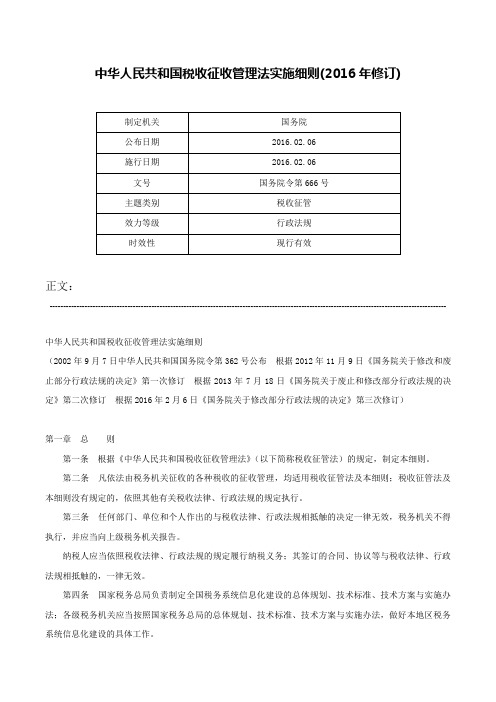
中华人民共和国税收征收管理法实施细则(2016年修订)正文:----------------------------------------------------------------------------------------------------------------------------------------------------中华人民共和国税收征收管理法实施细则(2002年9月7日中华人民共和国国务院令第362号公布根据2012年11月9日《国务院关于修改和废止部分行政法规的决定》第一次修订根据2013年7月18日《国务院关于废止和修改部分行政法规的决定》第二次修订根据2016年2月6日《国务院关于修改部分行政法规的决定》第三次修订)第一章总则第一条根据《中华人民共和国税收征收管理法》(以下简称税收征管法)的规定,制定本细则。
第二条凡依法由税务机关征收的各种税收的征收管理,均适用税收征管法及本细则;税收征管法及本细则没有规定的,依照其他有关税收法律、行政法规的规定执行。
第三条任何部门、单位和个人作出的与税收法律、行政法规相抵触的决定一律无效,税务机关不得执行,并应当向上级税务机关报告。
纳税人应当依照税收法律、行政法规的规定履行纳税义务;其签订的合同、协议等与税收法律、行政法规相抵触的,一律无效。
第四条国家税务总局负责制定全国税务系统信息化建设的总体规划、技术标准、技术方案与实施办法;各级税务机关应当按照国家税务总局的总体规划、技术标准、技术方案与实施办法,做好本地区税务系统信息化建设的具体工作。
地方各级人民政府应当积极支持税务系统信息化建设,并组织有关部门实现相关信息的共享。
第五条税收征管法第八条所称为纳税人、扣缴义务人保密的情况,是指纳税人、扣缴义务人的商业秘密及个人隐私。
纳税人、扣缴义务人的税收违法行为不属于保密范围。
第六条国家税务总局应当制定税务人员行为准则和服务规范。
中华人民共和国税收征收管理法-主席令第60号
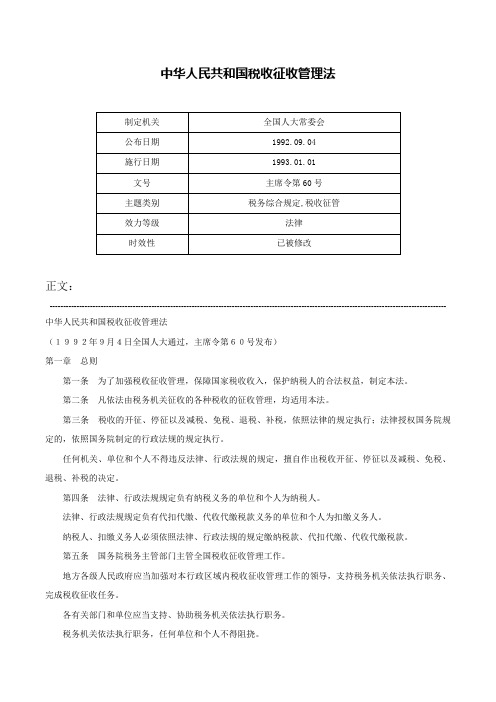
中华人民共和国税收征收管理法正文:---------------------------------------------------------------------------------------------------------------------------------------------------- 中华人民共和国税收征收管理法(1992年9月4日全国人大通过,主席令第60号发布)第一章总则第一条为了加强税收征收管理,保障国家税收收入,保护纳税人的合法权益,制定本法。
第二条凡依法由税务机关征收的各种税收的征收管理,均适用本法。
第三条税收的开征、停征以及减税、免税、退税、补税,依照法律的规定执行;法律授权国务院规定的,依照国务院制定的行政法规的规定执行。
任何机关、单位和个人不得违反法律、行政法规的规定,擅自作出税收开征、停征以及减税、免税、退税、补税的决定。
第四条法律、行政法规规定负有纳税义务的单位和个人为纳税人。
法律、行政法规规定负有代扣代缴、代收代缴税款义务的单位和个人为扣缴义务人。
纳税人、扣缴义务人必须依照法律、行政法规的规定缴纳税款、代扣代缴、代收代缴税款。
第五条国务院税务主管部门主管全国税收征收管理工作。
地方各级人民政府应当加强对本行政区域内税收征收管理工作的领导,支持税务机关依法执行职务、完成税收征收任务。
各有关部门和单位应当支持、协助税务机关依法执行职务。
税务机关依法执行职务,任何单位和个人不得阻挠。
第六条税务人员必须秉公执法,忠于职守;不得索贿受贿、徇私舞弊、玩忽职守、不征或者少征应征税款;不得滥用职权多征税款或者故意刁难纳税人和扣缴义务人。
第七条任何单位和个人都有权检举违反税收法律、行政法规的行为。
税务机关应当为检举人保密,并按照规定给予奖励。
第八条本法所称税务机关是指各级税务局、税务分局和税务所。
第二章税务管理第一节税务登记第九条企业,企业在外地设立的分支机构和从事生产、经营的场所,个体工商户和从事生产、经营的事业单位(以下统称从事生产、经营的纳税人)自领取营业执照之日起三十日内,持有关证件,向税务机关申报办理税务登记。
《税收征收管理法实施细则》修订对照表 中华人民共和国国务院令 第362号

《税收征收管理法实施细则》修订对照表中华人民共和国国
务院令第362号
无
【期刊名称】《广州财政会计》
【年(卷),期】2003(000)002
【总页数】3页(P46-48)
【作者】无
【作者单位】无
【正文语种】中文
【中图分类】F812.0
【相关文献】
1.中华人民共和国国务院令:国务院关于修改《中华人民共和国统计法实施细则》的决定 [J],
2.《税收征收管理法实施细则》修订对照表中华人民共和国国务院令 [J], 无
3.中华人民共和国专利法实施细则——(2001年6月15日中华人民共和国国务
院令第306号公布,根据2002年12月28日《国务院关于修改(中华人民共和
国专利法实施细则)的决定》修订) [J], 无
4.中华人民共和国国务院令第362号中华人民共和国税收征收管理法实施细则[J],
5.财政部国家税务总局有关负责人就《中华人民共和国增值税暂行条例实施细则》《中华人民共和国营业税暂行条例实施细则》《中华人民共和国消费税暂行条例实施细则》修订的有关问题答记者问 [J],
因版权原因,仅展示原文概要,查看原文内容请购买。
银行税务事项管理办法和实施细则

银行税务事项管理办法和实施细则银行税务事项管理办法和实施细则旨在规范银行在纳税方面的行为,促进银行依法纳税,加强税务管理,维护银行和税务部门的合法权益,优化税收环境,推进税收制度改革。
接下来,本文就银行税务事项管理办法和实施细则进行详细阐述,包括法律依据、适用范围、主要内容及对银行的影响等。
一、法律依据银行税务事项管理办法和实施细则的法律依据是《中华人民共和国税收征收管理法》、《中华人民共和国企业所得税法》、《中华人民共和国合同法》以及相关行政法规、规章和规范性文件等。
二、适用范围银行税务事项管理办法和实施细则适用于在中华人民共和国境内依法设立并开展业务的银行,包括国有银行、城市商业银行、农村信用社、外资银行、私营银行等各类银行机构。
三、主要内容1. 税务登记银行应在规定时间内向税务机关申请税务登记,并按照规定将相关纳税信息报送税务机关。
2. 申报纳税银行应按规定的时间和方式申报纳税,并及时缴纳税款。
银行应当制定并完善税务管理制度,明确税务管理的职责和流程,规范税务申报和税款缴纳的程序,遵守税收法规和规章,确保税务申报的真实性、及时性和准确性。
3. 税务筹划银行可以采取合法的税务筹划手段,降低税负和税务风险,但不得非法转移利润和逃避税款。
银行应当遵守税收法律和规定,不得采取虚假交易、假开发票等手段规避税收。
4. 税法咨询银行可以向税务机关咨询税务政策和法律法规,但不得向税务机关提出无法实现的、违法的或者有损税收公正的要求。
5. 税收信用评价税务机关将对银行纳税信用情况进行评价,并根据纳税信用情况给予优惠或者惩罚措施。
银行应当严格遵守税收法规和规定,维护良好的纳税信用,提高税收合规性和诚信度。
四、对银行的影响银行税务事项管理办法和实施细则的实施,对银行具有以下影响:1. 提高税收合规性和纳税质量,降低税务风险和避免税务处罚;2. 规范税务管理程序和流程,提高税务管理效率和质量;3. 提高银行的税收诚信度和纳税信用评级,获得税收优惠和政策支持;4. 加强银行的内部税务管理和税收风险预警,有效维护税务合规和风险防范;5. 推动税收制度改革和税务优化,提高税收透明度和公正性。
中华人民共和国税收管理法

(三)责成纳税人、扣缴义务人提供与纳税或者代扣代缴、代收代缴税款有关的文件、证明材料和有关资料;
(四)询问纳税人、扣缴义务人与纳税或者代扣代缴、代收代缴税款有关的问题和情况;
(五)到车站、码头、机场、邮政企业及其分支机构检查纳税人托运、邮寄应纳税商品、货物或者其他财产 的有关单据、凭证和有关资料;
(六)经县以上税务局(分局)局长批准,凭全国统一格式的检查存款帐户许可证明,查核从事生产、经营 的纳税人、扣缴义务人在银行或者其他金融机构的存款帐户;查核从事生产、经营的纳税人的储蓄存款,须经银 行县、市支行或者市分行的区办事处核对,指定所属储蓄所提供资料。
前款规定以外的纳税人办理税务登记的范围和办法,由国务院规定。
第十条从事生产、经营的纳税人,税务登记内容发生变化的,自工商行政管理机关办理变更登记之日起30日 内或者在向工商行政管理机关申请办理注销登记之前,持有关证件向税务机关申报办理变更或者注销税务登记。
第十一条纳税人按照国务院税务主管部门的规定使用税务登记证件。税务登记证件不得转借、涂改、损毁、 买卖或者伪造。
第二章税务管理
第二节帐簿、凭证 管理
第一节税务登记
第三节纳税申报
第一节税务登记
第九条企业,企业在外地设立的分支机构和从事生产、经营的场所,个体工商户和从事生产、经营的事业单 位(以下统称从事生产、经营的纳税人)自领取营业执照之日起30日内,持有关证件,向税务机关申报办理税务 登记。税务机关审核后发给税务登记证件。
第六章附则
第六章附则
第五十七条纳税人、扣缴义务人可以委托税务代理人代为办理税务事宜。 第五十八条农业税、牧业税、耕地占用税、契税的征收管理,参照本法有关规定执行。 关税、船舶吨税及海关代征税收的征收管理,依照法律、行政法规的有关规定执行。 第五十九条中华人民共和国同外国缔结的有关税收的条约、协定同本法有不同规定的,依照条约、协定的规 定办理。 第六十条本法施行前颁布的税收法律与本法有不同规定的,适用本法规定。 第六十一条国务院根据本法制定实施细则。 第六十二条本法自1993年1月1日起施行。1986年4月21日国务院发布的《中华人民共和国税收征收管理暂行 条例》同时废止。
国家税务总局关于贯彻《中华人民共和国税收征收管理法》及其实施细则若干具体问题的通知
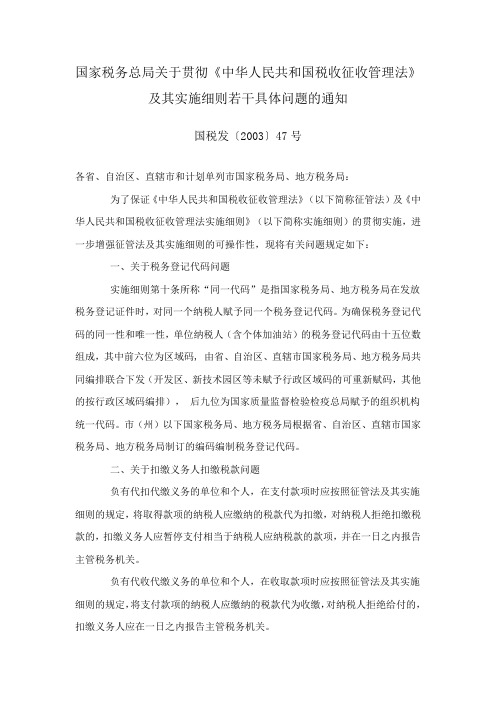
国家税务总局关于贯彻《中华人民共和国税收征收管理法》及其实施细则若干具体问题的通知国税发〔2003〕47号各省、自治区、直辖市和计划单列市国家税务局、地方税务局:为了保证《中华人民共和国税收征收管理法》(以下简称征管法)及《中华人民共和国税收征收管理法实施细则》(以下简称实施细则)的贯彻实施,进一步增强征管法及其实施细则的可操作性,现将有关问题规定如下:一、关于税务登记代码问题实施细则第十条所称“同一代码”是指国家税务局、地方税务局在发放税务登记证件时,对同一个纳税人赋予同一个税务登记代码。
为确保税务登记代码的同一性和唯一性,单位纳税人(含个体加油站)的税务登记代码由十五位数组成,其中前六位为区域码, 由省、自治区、直辖市国家税务局、地方税务局共同编排联合下发(开发区、新技术园区等未赋予行政区域码的可重新赋码,其他的按行政区域码编排),后九位为国家质量监督检验检疫总局赋予的组织机构统一代码。
市(州)以下国家税务局、地方税务局根据省、自治区、直辖市国家税务局、地方税务局制订的编码编制税务登记代码。
二、关于扣缴义务人扣缴税款问题负有代扣代缴义务的单位和个人,在支付款项时应按照征管法及其实施细则的规定,将取得款项的纳税人应缴纳的税款代为扣缴,对纳税人拒绝扣缴税款的,扣缴义务人应暂停支付相当于纳税人应纳税款的款项,并在一日之内报告主管税务机关。
负有代收代缴义务的单位和个人,在收取款项时应按照征管法及其实施细则的规定,将支付款项的纳税人应缴纳的税款代为收缴,对纳税人拒绝给付的,扣缴义务人应在一日之内报告主管税务机关。
扣缴义务人违反征管法及其实施细则规定应扣未扣、应收未收税款的,税务机关除按征管法及其实施细则的有关规定对其给予处罚外,应当责成扣缴义务人限期将应扣未扣、应收未收的税款补扣或补收。
三、关于纳税人外出经营活动管理问题纳税人离开其办理税务登记所在地到外县(市)从事经营活动、提供应税劳务的,应该在发生外出经营活动以前向其登记所在地的主管税务机关申请办理《外出经营活动税收管理证明》,并向经营地或提供劳务地税务机关报验登记。
最新税收征管法实施细则全文

最新税收征管法实施细则全文中华人民共和国税收征收管理法实施细则国务院令[2002]362号第一章总则第一条根据《中华人民共和国税收征收管理法》(以下简称税收征管法)的规定,制定本细则。
第二条凡依法由税务机关征收的各种税收的征收管理,均适用税收征管法及本细则;税收征管法及本细则没有规定的,依照其他有关税收法律、行政法规的规定执行。
第三条任何部门、单位和个人作出的与税收法律、行政法规相抵触的决定一律无效,税务机关不得执行,并应当向上级税务机关报告。
纳税人应当依照税收法律、行政法规的规定履行纳税义务;其签订的合同、协议等与税收法律、行政法规相抵触的,一律无效。
第四条国家税务总局负责制定全国税务系统信息化建设的总体规划、技术标准、技术方案与实施办法;各级税务机关应当按照国家税务总局的总体规划、技术标准、技术方案与实施办法,做好本地区税务系统信息化建设的具体工作。
地方各级人民政府应当积极支持税务系统信息化建设,并组织有关部门实现相关信息的共享。
第五条税收征管法第八条所称为纳税人、扣缴义务人保密的情况,是指纳税人、扣缴义务人的商业秘密及个人隐私。
纳税人、扣缴义务人的税收违法行为不属于保密范围。
第六条国家税务总局应当制定税务人员行为准则和服务规范。
上级税务机关发现下级税务机关的税收违法行为,应当及时予以纠正;下级税务机关应当按照上级税务机关的决定及时改正。
下级税务机关发现上级税务机关的税收违法行为,应当向上级税务机关或者有关部门报告。
第七条税务机关根据检举人的贡献大小给予相应的奖励,奖励所需资金列入税务部门年度预算,单项核定。
奖励资金具体使用办法以及奖励标准,由国家税务总局会同财政部制定。
第八条税务人员在核定应纳税额、调整税收定额、进行税务检查、实施税务行政处罚、办理税务行政复议时,与纳税人、扣缴义务人或者其法定代表人、直接责任人有下列关系之一的,应当回避:(一)夫妻关系;(二)直系血亲关系;(三)三代以内旁系血亲关系;(四)近姻亲关系;(五)可能影响公正执法的其他利害关系。
新中华人民共和国税收征收管理法
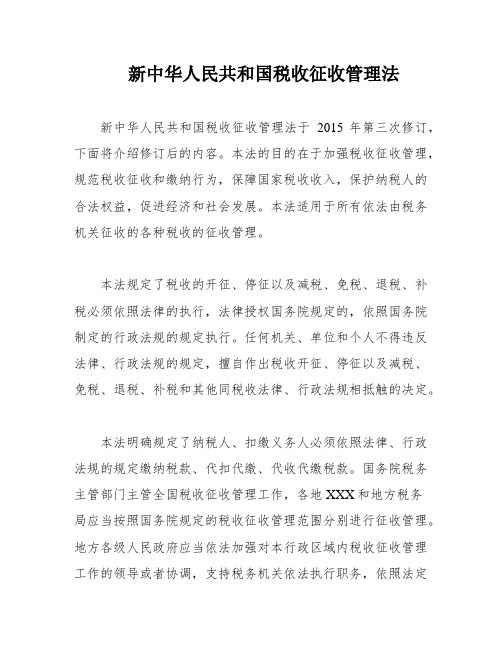
新中华人民共和国税收征收管理法新中华人民共和国税收征收管理法于2015年第三次修订,下面将介绍修订后的内容。
本法的目的在于加强税收征收管理,规范税收征收和缴纳行为,保障国家税收收入,保护纳税人的合法权益,促进经济和社会发展。
本法适用于所有依法由税务机关征收的各种税收的征收管理。
本法规定了税收的开征、停征以及减税、免税、退税、补税必须依照法律的执行,法律授权国务院规定的,依照国务院制定的行政法规的规定执行。
任何机关、单位和个人不得违反法律、行政法规的规定,擅自作出税收开征、停征以及减税、免税、退税、补税和其他同税收法律、行政法规相抵触的决定。
本法明确规定了纳税人、扣缴义务人必须依照法律、行政法规的规定缴纳税款、代扣代缴、代收代缴税款。
国务院税务主管部门主管全国税收征收管理工作,各地XXX和地方税务局应当按照国务院规定的税收征收管理范围分别进行征收管理。
地方各级人民政府应当依法加强对本行政区域内税收征收管理工作的领导或者协调,支持税务机关依法执行职务,依照法定税率计算税额,依法征收税款。
各有关部门和单位应当支持、协助税务机关依法执行职务。
税务机关依法执行职务,任何单位和个人不得阻挠。
第六条规定国家要使用现代信息技术装备各级税务机关,加强税收征收管理信息系统的现代化建设,并建立、完善税务机关与政府其他管理机关的信息共享机制。
纳税人、扣缴义务人和其他相关单位应按照国家相关规定,真实地向税务机关提供与纳税和代扣代缴、代收代缴税款有关的信息。
第七条规定税务机关应广泛宣传税收法律、行政法规,普及纳税知识,并为纳税人提供免费的纳税咨询服务。
第八条规定纳税人、扣缴义务人有权了解国家税收法律、行政法规的规定,以及与纳税程序相关的情况。
同时,纳税人、扣缴义务人有权要求税务机关保密其纳税情况,并且税务机关必须依法保护其隐私。
此外,纳税人还享有申请减税、免税、退税的权利,以及陈述权、申辩权,申请行政复议、提起行政诉讼、请求国家赔偿等权利,还有控告和检举税务机关、税务人员的违法违纪行为的权利。
中华人民共和国税收征收管理法

文章来源:/Content-996.htm免费咨询法律问题/tiwen.htm 律师在线解答云法律网拥有万名专业律师3-5分钟快速解决您的法律问题中华人民共和国税收征收管理法(新征管法)2001年4月28日第九届全国人民代表大会常务委员会第二十一次会议修订目录第一章总则第二章税务管理第一节税务登记第二节账簿、凭证管理第三节纳税申报第三章税款征收第四章税务检查第五章法律责任第六章附则第一章总则第一条为了加强税收征收管理,规范税收征收和缴纳行为,保障国家税收收入,保护纳税人的合法权益,促进经济和社会发展,制定本法。
第二条凡依法由税务机关征收的各种税收的征收管理,均适用本法。
第三条税收的开征、停征以及减税、免税、退税、补税,依照法律的规定执行;法律授权国务院规定的,依照国务院制定的行政法规的规定执行。
任何机关、单位和个人不得违反法律、行政法规的规定,擅自作出税收开征、停征以及减税、免税、退税、补税和其他同税收法律、行政法规相抵触的决定。
第四条法律、行政法规规定负有纳税义务的单位和个人为纳税人。
文章来源:/Content-996.htm免费咨询法律问题/tiwen.htm 律师在线解答云法律网拥有万名专业律师3-5分钟快速解决您的法律问题法律、行政法规规定负有代扣代缴、代收代缴税款义务的单位和个人为扣缴义务人。
纳税人、扣缴义务人必须依照法律、行政法规的规定缴纳税款、代扣代缴、代收代缴税款。
第五条国务院税务主管部门主管全国税收征收管理工作。
各地国家税务局和地方税务局应当按照国务院规定的税收征收管理范围分别进行征收管理。
地方各级人民政府应当依法加强对本行政区域内税收征收管理工作的领导或者协调,支持税务机关依法执行职务,依照法定税率计算税额,依法征收税款。
各有关部门和单位应当支持、协助税务机关依法执行职务。
税务机关依法执行职务,任何单位和个人不得阻挠。
第六条国家有计划地用现代信息技术装备各级税务机关,加强税收征收管理信息系统的现代化建设,建立、健全税务机关与政府其他管理机关的信息共享制度。
税收征收管理法实施细则
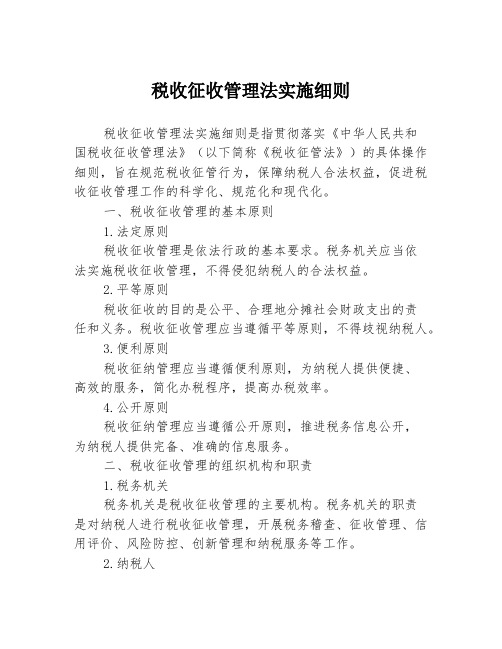
税收征收管理法实施细则税收征收管理法实施细则是指贯彻落实《中华人民共和国税收征收管理法》(以下简称《税收征管法》)的具体操作细则,旨在规范税收征管行为,保障纳税人合法权益,促进税收征收管理工作的科学化、规范化和现代化。
一、税收征收管理的基本原则1.法定原则税收征收管理是依法行政的基本要求。
税务机关应当依法实施税收征收管理,不得侵犯纳税人的合法权益。
2.平等原则税收征收的目的是公平、合理地分摊社会财政支出的责任和义务。
税收征收管理应当遵循平等原则,不得歧视纳税人。
3.便利原则税收征纳管理应当遵循便利原则,为纳税人提供便捷、高效的服务,简化办税程序,提高办税效率。
4.公开原则税收征纳管理应当遵循公开原则,推进税务信息公开,为纳税人提供完备、准确的信息服务。
二、税收征收管理的组织机构和职责1.税务机关税务机关是税收征收管理的主要机构。
税务机关的职责是对纳税人进行税收征收管理,开展税务稽查、征收管理、信用评价、风险防控、创新管理和纳税服务等工作。
2.纳税人纳税人是税收征收管理的主体。
纳税人的主要职责是依法纳税、报告税收信息、配合税务机关进行征税检查工作等。
3.税务干部税务干部是税收征收管理的关键力量。
税务干部的主要职责是遵守法律法规、保持纳税人的合法权益、开展税务管理工作等。
三、税务管理工作的基本要求1.资料真实纳税人提供的所有资料必须真实、准确。
税务机关在征收管理工作中必须保障纳税人的隐私,不得擅自泄露纳税人的个人身份、财产状况及相关情况。
2.审查严谨税务机关应当严格审核纳税人提供的报表、账簿等资料,妥善保管相关资料,及时处理问题。
3.信用建设税务机关应当根据纳税人的纳税行为和信誉情况以及其它综合因素,对纳税人进行信用评价。
4.纳税服务税务机关应当主动提供有关纳税、办税、税收政策等方面的服务,增强纳税人的税法意识和纳税自觉。
5.风险防控税务机关应当落实贯彻稽查风险防范体系,提高稽查工作质量和效率。
6.法治保障税务机关应当依法开展税务管理工作,保证税务管理行为的合法性,维护纳税人的合法权益。
中华人民共和国税收征管法及实施细则对照表
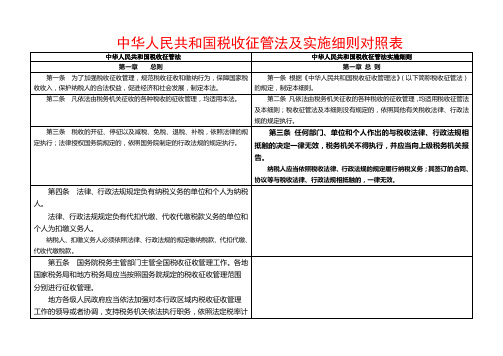
本条第一款规定以外的纳税人办理税务登记和扣缴义务人办理扣缴税款登记的范围和办法,由国务院规定。
第十一条各级工商行政管理机关应当向同级国家税务局和地方税务局定期通报办理开业、变更、注销登记以及吊销营业执照的情况。
通报的具体办法由国家税务总局和国家工商行政管理总局联合制定。
第十六条从事生产、经营的纳税人,税务登记内容发生变化的,自工商行政管理机关办理变更登记之日起三十日内或者在向工商行政管理机关申请办理注销登记之前,持有关证件向税务机关申报办理变更或者注销税务登记。
Байду номын сангаас第十四条纳税人税务登记内容发生变化的,应当自工商行政管理机关或者其他机关办理变更登记之日起30日内,持有关证件向原税务登记机关申报办理变更税务登记。
中华人民共和国税收征管法及实施细则对照表
中华人民共和国税收征管法
中华人民共和国税收征管法实施细则
第一章总则
第一章总则
第一条为了加强税收征收管理,规范税收征收和缴纳行为,保障国家税收收入,保护纳税人的合法权益,促进经济和社会发展,制定本法。
第一条根据《中华人民共和国税收征收管理法》(以下简称税收征管法)的规定,制定本细则。
第七十三条纳税人扣缴义务人的开户银行或者其他金融机构拒绝接受税务机关依法检查纳税人扣缴义务人存款帐户或者拒绝执行税务机关作出的冻结存款或者扣缴税款的决定或者在接到税务机关的书面通知后帮助纳税人扣缴义务人转移存款造成税款流失的由税务机关处十万元以上五十万元以下的罚款对直接负责的主管人员和其他直接责任人员处一千元以上一万元以下的罚款
第二条凡依法由税务机关征收的各种税收的征收管理,均适用本法。
第二条凡依法由税务机关征收的各种税收的征收管理,均适用税收征管法及本细则;税收征管法及本细则没有规定的,依照其他有关税收法律、行政法规的规定执行。
税收征管法与其实施细则对照表及解读两篇
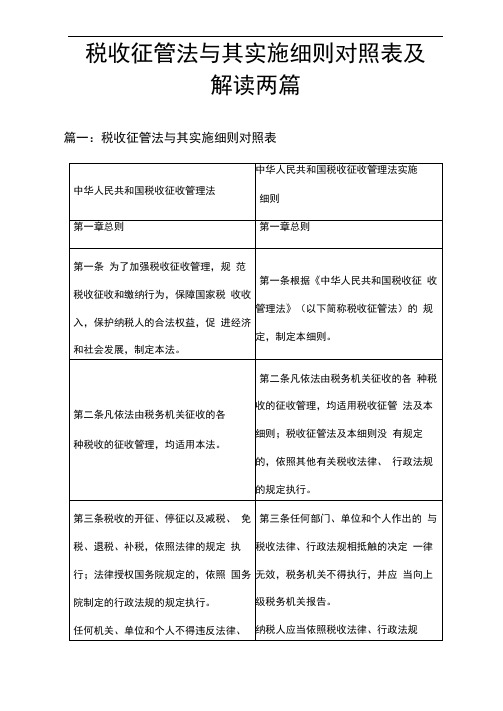
税收征管法与其实施细则对照表及解读两篇篇一:税收征管法与其实施细则对照表行政法规的规定,擅自作出税收开征、停征以及减税、免税、退税、补税和其他同税收法律、行政法规相抵触的决定。
F84笫四条法律、行政法规规定负有纳税义务的单位和个人为纳税人。
法律、行政法规规定负有代扣代代缴、代收代缴税款义务的单位和个人为扣缴义务人。
纳税人、扣缴义务人必须依照法律、行政法规的规定缴纳税款、代扣代缴、代收代缴税款。
第五条国务院税务主管部门主管全国税收征收管理工作。
各地国家税务局和地方税务局应当按照国务院规定的税收征收管理范围分别进行征收管理。
F76 的规定履行纳税义务;其签订的合同、协议等与税收法律、行政法规相抵触的,一律无效。
第四十九条承包人或者承租人有独立的生产经营权,在财务上独立核算, 并定期向发包人或者出租人上缴承包费或者租金的,承包人或者承租人应当就其生产、经营收入和所得纳税,并接受税务管理;但是,法律、行政法规另有规定的除外。
发包人或者出租人应当自发包或者出租之日起30日内将承包人或者承租人的有关情况向主管税务机关报告。
发包人或者出租人不报告的,发包人或者出租人与承包人或者承租人承担纳税连带责任。
F第七十六条税务机关违反规定擅自改变税收征收管理范围和税款入库预算级次的,责令限期改正,对直接负责的主管人员和其他直接责任人员依法给予降级或者撤职的行政处分。
偿地为纳税人提供纳税咨询服务。
优化纳税服务,提高税法遵从度,降 低税收风险。
第八条纳税人、扣缴义务人有权向 税务机关了解国家税收法律、行政法 规的规定以及纳税程序有关的情况。
纳税人、扣缴义务人有权要求税务机 关为纳税人、扣缴义务人的情况保密。
税务机关应当依法为纳税人、扣缴义 务人的情况保密。
纳税人依法享有申请减税、免税、退 税的权利。
纳税人、扣缴义务人对税务机关所作 出的决定,享有陈述权、申辩权;依 法享有申请行政复议、提起行政诉讼、 请求国家赔偿等权利。
委托代征管理办法
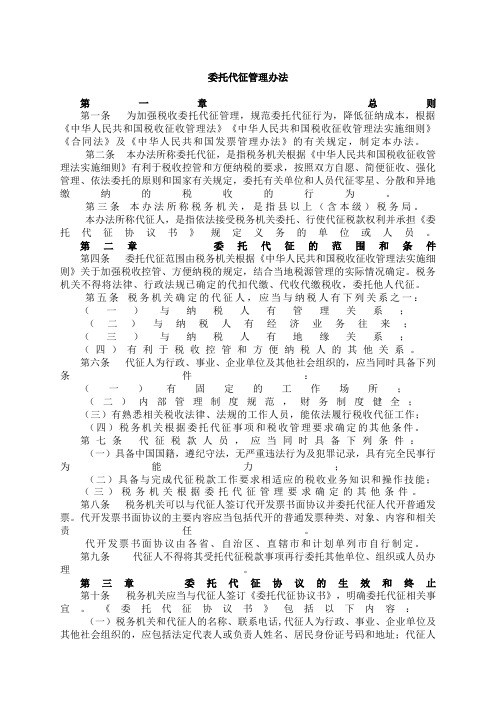
委托代征管理办法第一章总则第一条为加强税收委托代征管理,规范委托代征行为,降低征纳成本,根据《中华人民共和国税收征收管理法》《中华人民共和国税收征收管理法实施细则》《合同法》及《中华人民共和国发票管理办法》的有关规定,制定本办法。
第二条本办法所称委托代征,是指税务机关根据《中华人民共和国税收征收管理法实施细则》有利于税收控管和方便纳税的要求,按照双方自愿、简便征收、强化管理、依法委托的原则和国家有关规定,委托有关单位和人员代征零星、分散和异地缴纳的税收的行为。
第三条本办法所称税务机关,是指县以上(含本级)税务局。
本办法所称代征人,是指依法接受税务机关委托、行使代征税款权利并承担《委托代征协议书》规定义务的单位或人员。
第二章委托代征的范围和条件第四条委托代征范围由税务机关根据《中华人民共和国税收征收管理法实施细则》关于加强税收控管、方便纳税的规定,结合当地税源管理的实际情况确定。
税务机关不得将法律、行政法规已确定的代扣代缴、代收代缴税收,委托他人代征。
第五条税务机关确定的代征人,应当与纳税人有下列关系之一:(一)与纳税人有管理关系;(二)与纳税人有经济业务往来;(三)与纳税人有地缘关系;(四)有利于税收控管和方便纳税人的其他关系。
第六条代征人为行政、事业、企业单位及其他社会组织的,应当同时具备下列条件:(一)有固定的工作场所;(二)内部管理制度规范,财务制度健全;(三)有熟悉相关税收法律、法规的工作人员,能依法履行税收代征工作;(四)税务机关根据委托代征事项和税收管理要求确定的其他条件。
第七条代征税款人员,应当同时具备下列条件:(一)具备中国国籍,遵纪守法,无严重违法行为及犯罪记录,具有完全民事行为能力;(二)具备与完成代征税款工作要求相适应的税收业务知识和操作技能;(三)税务机关根据委托代征管理要求确定的其他条件。
第八条税务机关可以与代征人签订代开发票书面协议并委托代征人代开普通发票。
代开发票书面协议的主要内容应当包括代开的普通发票种类、对象、内容和相关责任。
- 1、下载文档前请自行甄别文档内容的完整性,平台不提供额外的编辑、内容补充、找答案等附加服务。
- 2、"仅部分预览"的文档,不可在线预览部分如存在完整性等问题,可反馈申请退款(可完整预览的文档不适用该条件!)。
- 3、如文档侵犯您的权益,请联系客服反馈,我们会尽快为您处理(人工客服工作时间:9:00-18:30)。
中华人民共和国税收征收管理法实施细则中华人民共和国税收征收管理法实施细则是根据税收征收管理法
的规定,进一步明确和规范税收征收管理的具体细则,以保障纳税人
的合法权益、维护税收征收秩序和国家财政稳定发展。
本文将着重介
绍税收征收管理法实施细则中有关中华人民共和国合同的内容。
税收征收管理法对合同的规定
中华人民共和国税收征收管理法第二十四条规定:纳税人应当按
照实际情况填写、报送纳税申报表格,并且正确、完整、及时地填写、报送有关资料、凭证和证明材料。
纳税人在申报纳税时,应当依法缴
纳税款。
中华人民共和国税收征收管理法第二十五条规定:税务机关对纳
税申报表格和有关资料、凭证、证明材料进行核查,可以要求纳税人
提供更多的资料、凭证和相关情况说明。
根据上述规定,纳税人在与税务机关签订合同时,必须按照实际
情况填写合同相关内容,并且应当正确、完整、及时地提供有关资料、凭证和证明材料,以便税务机关核查。
同时,纳税人在申报纳税时,
应当依法缴纳税款,否则将面临税务部门的相应处罚。
税收征收管理法实施细则对合同的细化规定
根据中华人民共和国税收征收管理法实施细则的相关规定,合同
具有以下细化规定:
合同内容应当合法合规
税收征收管理法实施细则第九条规定:纳税人在纳税申报和缴纳
税款过程中,应当按照法律法规、税收政策以及合同约定进行操作。
纳税人不得利用合同规避税收义务。
综上所述,纳税人在与税务机关签订合同时,应当确保合同内容
合法合规,遵守相关法律法规和税收政策。
纳税人不得利用合同规避
相应的税收义务。
合同证明材料应当正确、准确
税收征收管理法实施细则第二十五条规定:税务机关对纳税申报
表格和有关资料、凭证、证明材料进行核查,可以要求纳税人提供更
多的资料、凭证和相关情况说明。
纳税人在税收申报过程中提供的资料、凭证和证明材料应当真实、准确、有据可查,否则税务机关有权要求纳税人提供更多相关资料或
进行调查核实。
因此,纳税人在与税务机关签订合同时,必须提供真实、准确、全面的证明材料,以便税务机关核实申报数据的真实性。
总结
中华人民共和国税收征收管理法实施细则对于合同内容、纳税申
报和缴纳税款过程中提供的证明材料等方面提出了明确的规定,以保
障纳税人的合法权益、维护税收征收秩序和国家财政稳定发展。
因此,纳税人在与税务机关签订合同时应当谨慎处理,确保合同内容合法合规,提供真实、准确、全面的证明材料,全面遵守税收征收管理法和
其实施细则的规定。
